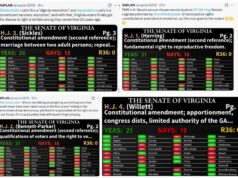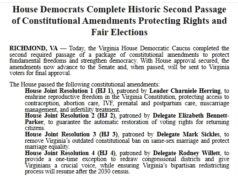by Luke Levasseur
I strongly favor anti-gerrymandering reforms that will require legislative district maps to be drawn in a nonpartisan manner to fairly represent Virginia’s population—and not to improperly favor one party or protect incumbents. That is why I oppose the proposed constitutional amendment regarding redistricting.
As the 2020 legislative session approaches, many progressive Democrats are examining the proposed amendment’s text and learning how it would create a partisan commission that would be unlikely to end gerrymandering as the amendment’s supporters claim. Even more alarming, the redistricting amendment’s flaws pose a substantial risk of even worse gerrymandering in the future.
Virginia’s constitution requires that two General Assemblies (with an intervening election) carefully consider and approve any proposed amendment before it goes to the voters. The proposed amendment was passed in February 2019 after a rushed process in which senators and delegates had “only about 20 minutes to assess the latest iteration that was amended four times in three weeks before it was brought to a vote.” Our legislators should not approve the amendment a second time merely because they voted yes last February. Instead, they should analyze the proposed amendment’s language and probable effects, and vote NO on the Redistricting Amendment (SJ306).
No Constitutional Redistricting Criteria. The amendment’s language matters; so please take a few minutes to read the three-page document linked here. Although some of its supporters claim that the “constitutional amendment ensures that no matter which party holds the majority, there will never be partisan gerrymandering again,” that is simply not correct; nothing in its text prohibits gerrymandering in any way. The proposed amendment creates a commission to perform the redistricting function, but the amendment includes no criteria for how the commission will draw district maps.
To dictate how the commission would draw district maps, the legislature will have to negotiate and pass “enabling legislation,” including “criteria bills.” But unlike a constitutional amendment (which can only be changed through a multi-year, difficult process), criteria legislation can be changed through the ordinary legislative process. The party in power at the time of redistricting is free to change the criteria and require that the commission gerrymander Virginia to maximize that party’s representation. This may feel good for Democrats who recently gained the majority in the General Assembly, but nothing in this constitutional amendment prevents the commission structure from being abused if/when power changes hands in the future.
It’s Anything But Nonpartisan. In addition to the failure to stop gerrymandering, the language of the constitutional amendment contains at least two substantial flaws: (1) the commission’s membership will include currently elected partisan politicians (and thus will not accomplish the goal of nonpartisan redistricting), and (2) the super-majority requirements that must be satisfied to agree on legislative maps will enable the Republicans to effectively veto the commission’s work—and potentially obtain legislative district maps that are gerrymandered in their favor for elections to be held as early as 2021.
First, the commission would not be “nonpartisan” in any meaningful sense of that word. Half of the commission’s members will be current partisan legislators, and legislators will also have substantial influence regarding the selection of the commission’s eight citizen-members. As a result, the amendment does not empower nonpartisan citizens or experts to create fair maps. At best, the amendment would allow self-interested partisan politicians, and the politically appointed citizen-members, to battle over the details of district maps to protect incumbent seats and favor their party. That is the same type of partisan wrangling we have under the current system, though it would be conducted by a commission instead of the elected legislature.
Second, the amendment’s super-majority provisions, which are found in section (d)(1) to (d)(3), give just two legislator-members of the same party an absolute veto on the commission’s maps for their chamber. The super-majority rules also allow any three legislator-members to veto the House of Representatives map. Any vetoed maps go to the Virginia Supreme Court to establish districts. Although these super-majority provisions might work in a different (nonpartisan) commission, this amendment gives Republicans tremendous leverage to extract concessions from other commissioners, and if that doesn’t work, the Republicans are free to veto any maps they don’t like and send the redistricting process to the Virginia Supreme Court.
Why Sending Redistricting to the Court is a Bad Idea. You may ask “what’s wrong with redistricting by the Virginia Supreme Court”? As an initial matter, establishing legislative districts is not within the typical functions or expertise of the Virginia Supreme Court. Generally, appellate judges review facts and legal determinations made by lower courts; they don’t perform tasks such as developing redistricting maps. To the extent supporters of the amendment assert that redistricting questions can end up in the Virginia Supreme Court under the current system, that is true—but only in the context of reviewing decisions in lawsuits previously filed and litigated in lower courts, not in drawing districts from scratch. Supporters also argue that a special master could be appointed to actually draw the maps—but that would still require the Supreme Court to determine where the district lines should be and to issue the maps, which then could not be reviewed other than for potential Voting Rights Act violations, completely disregarding the impact on partisanship.
The Virginia Supreme Court’s composition creates another substantial concern with assigning the Court the redistricting role under the constitutional amendment. Virginia’s justices are selected by the General Assembly, and during the last 10 years, the Republican-controlled legislatures (which were elected based on unconstitutionally gerrymandered maps) selected almost all of the Supreme Court’s members. This incentivizes Republican commission members to refuse any compromise, believing that any vetoed proposal would be rewritten by the majority Republican-appointed Virginia Supreme Court in a manner that would favor their party.
One more judicial review issue. Under the U.S. Supreme Court’s recent ruling that political gerrymandering does not does not create a justiciable controversy, a Virginia Supreme Court redistricting map could only be challenged regarding violations of the federal Voting Rights Act. Why would our party amend the constitution in a way that forces us to rely on “Republican good faith” to not abuse the super-majority rules—or to bet the future on potential racial gerrymandering litigation in federal court?
OneVA2021’s Position. After building interest in the anti-gerrymandering cause for several years, OneVA2021’s reform proposal was killed off early in the 2019 legislative process. Subsequently, the organization decided to throw its weight behind the proposed constitutional amendment that eventually passed the (Republican-controlled) legislature. The amendment’s supporters, including OneVA2021, recognize that the proposal raises concerns but claim the problems are overblown. They also point to gerrymandering done by both parties (as recently as 2011-2012, and 2018) and contend that, in the event the commission cannot agree on maps, it would be better to have the Republican-appointed Virginia Supreme Court establish legislative districts than to trust our elected legislature with the task.
Trading the Democrats’ recently won political advantage (after all the work necessary to build three blue waves) in exchange for a fair, nonpartisan commission could be a principled, reasonable decision that I would support. But giving up that advantage for the proposed constitutional amendment’s partisan commission, with super-majority rules likely to default to the Supreme Court (and disadvantage Democrats) would be a mistake—and a potential long-term strategic disaster.
Locking in a Self-Fulfilling Partisan Process. Delegate Mark Levine (HD-45) points out not only would the constitutional amendment’s commission potentially allow pro-Republican gerrymandering of Virginia in 2021, but the commission’s structure could result in unreviewable Republican gerrymandering well into the future. The Virginia Supreme Court could establish Republican-friendly legislative district maps, and Republican majorities elected as a result of those maps could appoint conservative judges. That cycle could go on indefinitely, locking Democrats out of legislative power despite being a majority of the population. (Note: These concerns and others are addressed in Delegate Levine’s extensive Primer on Gerrymandering, available at this link.)
Better Alternatives to the Amendment. Rejecting the flawed constitutional amendment in 2020 does not mean the Democrats should do nothing to stop gerrymandering in 2021. Instead of locking into the constitution an amendment that has substantial problems, the General Assembly should pass (and the Governor should sign) legislation that: (1) requires use of certain computer models and/or specific criteria that will result in districts that provide fair representation and that don’t favor one party or incumbents; (2) prohibits techniques that lead to gerrymandered districts; and (3) mandates a completely transparent redistricting process. Delegate Levine favors legislation forcing the General Assembly to redistrict with an “open-source computer program, created by some of the country’s best gerrymandering-prevention experts, [which] would be transparently fair,” but other strict legal criteria could be imposed under different proposed legislation. Then, after redistricting is done in a fair manner during 2021, the General Assembly could develop and pass a constitutional amendment before our next redistricting in 2031 that doesn’t contain the flaws of the current proposal and creates a nonpartisan commission that would reliably develop and implement fair districts.
The bottom line is that the proposed constitutional amendment does not provide nonpartisan reform, and its language creates a real opportunity for the Republicans to gerrymander the Commonwealth in their favor. This is not a case of “not letting the perfect be the enemy of the good.” The amendment’s combination of super-majority requirements with partisan commission members is flawed, and it would give partisan Republicans on the commission substantial leverage over Democrats as well as veto power over any commission’s maps.
Virginia’s two-year process to change our constitution wisely forces legislators to re-examine a potential amendment carefully—and gives them an opportunity to kill proposals when a substantial chance for bad consequences becomes clear. Most of the Democratic delegates and senators voted YES during the rushed February 2019 vote, but numerous problems with the proposed amendment have been exposed and make clear that in 2020, Democrats should Vote NO on the redistricting amendment (SJ306).
Note: This article originated in an email to a friend—and former OneVA2021 volunteer—who asked for details when I explained what the redistricting amendment’s language actually provided; that message was revised as an email to the grass roots group, Virginia Democracy Forward, and has been revised further above.









![[UPDATED 1/29/26] Audio: Sen. Tim Kaine Talks to Blue Virginia About His “Five-Point Plan” to Fight Trump’s Orban-Like Assault on US Democracy; Civil Disobedience a la MLK Jr.; Trump’s Bogus “Energy Emergency”; the Crucial Importance of the 2025 VA Elections; etc.](https://bluevirginia.us/wp-content/uploads/2025/02/kaineinterview2-100x75.jpg)

